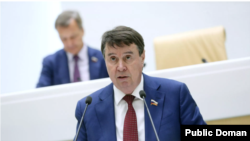On October 18, Russia’s RT state broadcaster quoted Russian Senator Sergey Tsekov, calling on Russians abroad to return home, citing the purportedly high level of safety in the country:
“A normal person should understand that Russia is now the safest country in the world to live. At least among European countries. We need to explain that everything is fine with us. I think they will return, and many are returning.”
That is false.
Human trafficking forced labor and other forms of modern slavery flourish in Russia “disproportionally affecting women and children,” a joint report by three rights groups in October 2023 said.
When considering life expectancy and murder rates, Russia is not safer than its European neighbors.
In 2021, Russia had a homicide rate of 6.8 deaths per 100,000 people. Europe's homicide rate is 2 per 100,000 people.
Compared to the rest of Europe, Russia has a life expectancy of 72.72 years, which is just slightly better than Kosovo, which has the worst life expectancy in Europe at 72.15 years.
The call for Russians to return home is a response to the country’s brain drain, which was already occurring before Russia launched its full-scale invasion of Ukraine in February 2022. The war has greatly exacerbated emigration.
In March, The Economist reported that over the last three years, Russia lost 2 million more people compared to its average annual rates.
Share America, the U.S. State Department’s platform for sharing American perspectives and culture with the world, reported in August that “[a]bout 1 million Russians have left [Russia] since 2022, including an estimated 100,000 IT specialists who comprise 10% of the technology sector.”
Apart from the brain drain, Russia is expected to experience a more general demographic decline by 2036, with pessimistic projections showing a Russian population of 134,000,000 people by 2036, down from its current population of 146,000,000.
Tsekov’s false claim about the level of “safety” inside Russia appears to be aimed at reversing the country’s brain drain and broader demographic decline.
While appealing for Russians abroad to return home, he added a caveat, saying that any Russian who supported Ukraine's war effort should be punished:
“There are also those who have talked themselves into decent court sentences. They will need to be detained and tried. Those who helped the armed forces of Ukraine. They need to be punished. They should receive a significant punishment for this.”
The idea that the invitation to return home should not be extended to Russian emigrants who oppose the government seems to be supported by Russia's leadership. For instance, Vyacheslav Volodin, a close ally of President Vladimir Putin who is chairman of the State Duma, the lower chamber of the country's parliament, portrayed Russian citizens who support Ukraine as traitors by nature.
Such rhetoric is backed by Russia’s record of punishing dissidents. There are currently at least 558 political prisoners in Russia, the Memorial Human Rights Defense Center reported in April 2023. They include Putin’s political opponents Alexey Navalny and Vladimir Kara-Murza, both of whom were arrested after returning to Russia from abroad and sentenced to long prison terms based on their political views.
Russia has also detained journalists, including Alsu Kurmasheva, a U.S.-Russian dual citizen working for Radio Free Europe/Radio Liberty, whose detention was just extended for failing to register as a foreign agent.
Evan Gershkovich, a Russia-based reporter for The Wall Street Journal, was detained in March on espionage charges. If convicted, he could face up to 20 years in prison.






